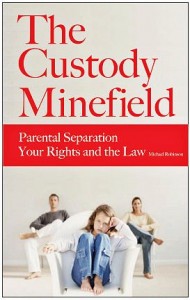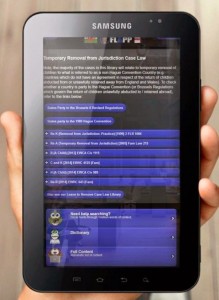What we do, and why
We have a simple goal. To provide high quality information to parents to help them ensure they maintain a full relationship with their children after separation or divorce.
Sadly, sometimes parents cannot reach agreement between themselves and court is a necessity, but people cannot afford mainstream legal advice. The legal system has evolved over many hundreds of years where trained and accredited legal advisers represent members of the public. Since cuts to legal aid (and previously for those who did not qualify for legal aid and who could not afford solicitors), members of the public face the daunting task of navigating a complex system, where a lack of knowledge can have a devastating impact on their family life after.
The positive news is… with a well reasoned and well prepared case that focuses on the needs of the child, good outcomes do regularly happen in court, and even in the most complex and intractable of cases. The quality of judicial decision making is improving, the courts are slowly adjusting to members of the public representing themselves, useful judgments are routinely published which help in supporting legal arguments in other cases, and the principle that both parents should be involved in their children’s lives is becoming more established.
It’s not a hopeless system, but it is still far from ideal, and remains a system geared to professionals, but swamped by amateurs.
Many parents can manage their own cases, but do better with help, and for them, access to detailed information is essential. Where parents have access to knowledge, and when they keep a reasoned and reasonable approach in court, their chance of securing a positive outcome for their children greatly improves.
If you read no other of our guides, please read ABC – Attitude, Behaviour and Conduct. Getting this right or wrong, in our experience, significantly impacts on the final outcome.
The early years
When we started this project in 2006, there was little information available to support parents. Our first project, The Custody Minefield book, reached no.2 on Amazon’s Divorce Chart and was recommended for any separating parent by the Magistrates’ Magazine and by the Divisional Chair of the British Association for Counselling and Psychotherapy.
started this project in 2006, there was little information available to support parents. Our first project, The Custody Minefield book, reached no.2 on Amazon’s Divorce Chart and was recommended for any separating parent by the Magistrates’ Magazine and by the Divisional Chair of the British Association for Counselling and Psychotherapy.
Paperbacks have draw backs. Firstly, they are often out-of-date before they are published. To republish is costly, and time consuming. Second, they normally fail to go into sufficient depth. The average ‘self-help’ guide is 40,000 to 200,000 words. Our guide series is 1.5million and leads parents through the legal process, step-by-step, and stage-by-stage.
In 2007, we started providing information online, and in 2008, The Times named us as one of their recommended family law websites.
2009-2011 saw us lead the campaign to reform relocation related family law. Despite the court’s initial refusal to review the leading legal guidance in this area (which placed adult concerns before child welfare), following extensive lobbying in Westminster and with the support of Sir Bob Geldof, the law was reviewed and changed in 2011.
In 2012 we moved our guides to a solely digital format, and our first version of FLAPP (our online Family Law App) went live. Page views are well in excess of 1million a year, and equally see mums and dads use the content.
With family law changing in April 2014, and changes only being confirmed a matter of weeks before the new legislation was enacted, we were still able to have our new guides published before the changes went live. More than this, the online format meant we could provide court forms, downloadable case law, draft court orders, parenting plans and other documents which a parent will need during court proceedings. It’s an ever evolving, constantly updated information resource.
We’ve also helped fill the void left by cuts to third sector funding. Many charities struggle to provide detailed guides. They simply lack the resources to create, maintain, and update them. Our guides are now used by many charity staff. While they focus on providing face-to-face and telephone support, we focus on providing information which can support their advice and keep them up-to-date.
There is nothing available for parents which is as advanced or detailed as our family law app. Accessible on any platform, be it phone, tablet or computer, it covers not only court process, but many crisis situations which parents face.
Plans for the future
Our guides cover the vast majority of situations which parents may face, but there are still areas where we aim to publish in the year ahead. Appeal, parental responsibility for lesbian non-biological parents, wardship, are a few examples of new content being worked upon. We’ll also be bringing out more video guides, embedding these within our app, and start to offer sample statements, skeleton arguments and other documents which a parent may need to provide the court.
If you find what we offer helpful, and you will, we ask one thing. Tell others about what we do and share details of our site and resources on social media. Sometimes we’re told “you’ve no idea how it helped me.” We do, so please help us to help others, by spreading the word.
